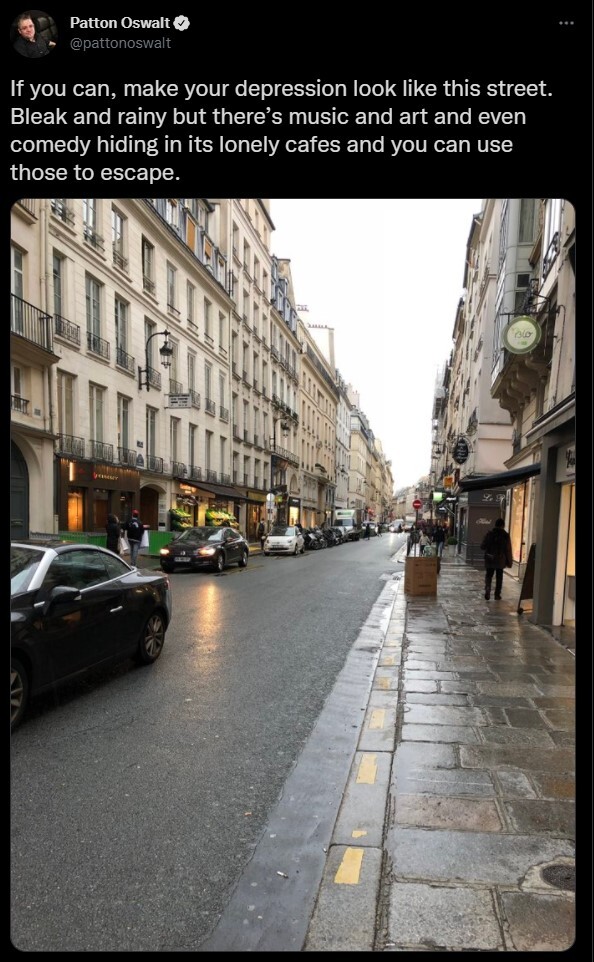Why So Many Comedians Struggle With Mental Health

I remember I was so depressed I was going to jump out a window on the tenth floor. They sent a priest up to talk to me. He said, "On your mark..."
Rodney Dangerfield
All the commercials on TV today are for antidepressants, for Prozac or Paxil. And they get you right away. "Are you sad? Do you get stressed, do you have anxiety?" "Yes, I have all those things! I'm alive!"
Don't Miss
Ellen DeGeneres
I have a paper cut from writing my suicide note. It's a start…
Stephen Wright
If you want to say that mental health is no laughing matter, we won’t argue with you. And despite their jokes (when it comes to anxiety and depression, they got a million of ‘em), most comedians wouldn’t argue with you, either.
But if comedy is about revealing some kind of truth, then it would be inherently dishonest for comics to avoid the subject. More than ever, comedians are discussing their struggles with mental health, both on stage and in public conversation.
If it feels like those challenges are baked right into the comedian persona, you’re right. There’s even a name for the seemingly contradictory relationship between depression, anxiety, and the people who make us laugh: The sad clown paradox. For many comedians, comedy is the coping strategy for dealing with feelings of inferiority, anger, or lack of approval.
In fact, what is the foundation of most comic routines if not that age-old formula Comedy = Tragedy + Time?
A Funny Spin on Despair
A list of comedians who don’t talk about their mental health challenges would probably be shorter than a list of those who do. Sarah Silverman, Robin Williams, Maria Bamford, Richard Pryor, Richard Lewis, Joan Rivers, Chris Gethard, Stephen Fry, Andy Richter, Patton Oswalt, Woody Allen, Ellen DeGeneres … you get the idea.
For many of them growing up, comedy was the only way to manage a world in which they didn’t seem to fit.
“I despised myself from pretty much close to getting out of the womb,” says comic Richard Lewis in Spark of Madness, part of CNN’s 8-part documentary on the history of comedy. “I was always wrong. Let’s start with that. When you are always wrong, you seek an audience to disprove that theory.”
For kids who don’t feel popular (or accepted or understood or loved or …), making others laugh is a way out, providing “a feeling of control over a situation in which they would otherwise be powerless.” In a 2014 survey of comedians, one comic confirmed that their motivation was “validation via the audience. We are trying to fill a hole.”
For many comedians, humor is a "counter phobic" response to the darkness they feel, says clinical psychologist Deborah Serani. Many professional funny people have higher-than-average intelligence, she says, and that quick-thinking brain helps them put a funny spin on despair. (The “comedians are smarter than the average bear” thing is backed by science -- a 1975 study found that comics have higher-than-average to well-above-average intelligence.)
Many are fooled, but the funny face that comics present to the world often masks “a terrible struggle,” Serani says. “The laughter distracts from feelings of weakness.”
It’s no wonder that Hollywood’s Laugh Factory has an in-house therapist, Ildiko Tabori. While she hasn’t done the research, Tabori doesn’t necessarily believe that comedians are struggling any more than the rest of us. “But they are much more open, and they can use (comedy) as a platform to talk about their stuff,” she says. “We’re all a little bit crazy. They’re just owning it.”
“Are comedians more depressed? I bet there’s a lot of depressed stock brokers. I don’t know,” Chris Gethard says in Laughing Matters, a short documentary about comedy and mental health. “I’m no expert. Just another white guy in his 30s with glasses who does comedy and gets sad.”
But here’s the thing: Comedians may actually be more depressed than the average stockbroker. Or dog walker. Or pick your profession.
Research published in the British Journal of Psychiatry reveals that a majority of comedians share a kind of “psychotic personality,” scoring higher than average people and even other performers like actors for both introverted and extraverted personality traits.
That creativity used to generate humor is “strikingly similar to those characterizing the cognitive style of people with psychosis – both schizophrenia and bipolar disorder,” says Professor Gordon Claridge of the University of Oxford's Department of Experimental Psychology.
“Comedy may partly be a form of self-medication,” Claridge says, “something we don’t see at all with other artists.”
We love the wildly creative comedians like Robin Williams and Jonathan Winters who seem to pull ideas from the ether at lightning-fast speeds. Both comics were diagnosed with bipolar disorder.
“Manic thinking, which is common in people with bipolar disorder, may help people combine ideas to form new, original and humorous connections,” says Claridge.
But that talent sure doesn’t make actual living any easier.
Can you be funny and be well?
Comedians can have an insidious relationship with their anxiety. What if, a comedian might wonder, my anxiety and depression are the secret ingredients that make me so freaking funny? Will getting well mean losing the one thing that gives me worth in the world?
Don’t fall for that line of thinking, advises Gethard in his comedy special Career Suicide. He was worried that medication might impair his ability to write and tell jokes, which led to a lot of wasted years based on those unfounded fears. “Because I’m happy to tell you, at least in my case, I am significantly f***ing funnier on medication.”
Even if medication makes one less funny (it doesn’t), Sarah Silverman says the exchange wouldn’t be worth it. “All of us romanticized depression, to a degree, but I’d rather be well,” she says. “There’s nothing more important to me than being funny, except being well.”
Another idea to avoid is that comedy can solve anxiety and depression. It is indeed a coping mechanism, but it’s not a solution.
“If you are thinking about doing comedy as a substitute for therapy, it doesn’t work. I tried. I tried for a long time,” Gethard says. “It’s the most beautiful thing in the world. I love it more than anything. But it’s not a safe space to heal.”
Whether it’s medication, therapy, or other treatments, more comedians are advocating for people to find the help they need. While there are no magic wands to make anxiety and depression disappear, there are tools that can ease the pain.

Patton Oswalt Twitter
Laughter may not be the best medicine, but scientifically speaking, it is medicine. “We know from a biochemical standpoint that it increases the level of endorphins, dopamine, serotonin — all things that produce joy in the human brain,” says Peter Sheras, a professor emeritus of psychology at the University of Virginia.
So by making us laugh, comedians help us -- and themselves -- feel better. And by talking about their own struggles, they help reduce the stigma around mental health issues.
Maria Bamford has waged a public battle with anxiety and bipolar II disorder. One reason she’s so open about those issues in her stand-up is to let others know they aren’t alone. “If you talk to anyone for over 20 minutes, they will reveal some very odd anxiety or type of OCD or bizarre hidden belief system,” she says. “I have been on a lot of Southwest Airlines flights. The most ‘together’ looking people are also viscerally afraid of ice.”
John Moe hosts Depresh Mode, a podcast that often features comedians like Bamford talking about their challenges. Whether it’s on a pod or onstage, says Moe, those stories help others who are struggling.
“Suddenly they’re not alone anymore, and they’re not unusual anymore,” he says. “And so what do they do after holding it in all these years? They can finally exhale in relief, and that exhale comes out as a laugh.”
Top image: Netflix